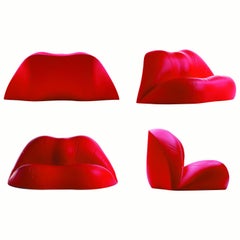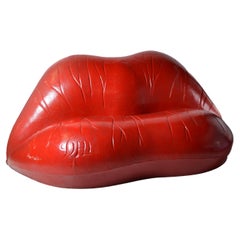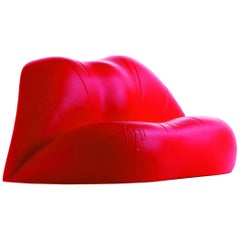Contemporary Experimental
to
1
1
1
4
3
2
2
Creator: BD Barcelona Design
Dalilips Sofa Designed by Salvador Dalí
By Salvador Dalí, BD Barcelona Design
Located in Brooklyn, NY
Dalilips is the famous sofa in the shape of a mouth which Salvador Dalí created together with Oscar Tusquets in 1972 for the Mae West room at the Dalí Museum...
Category
21st Century and Contemporary Spanish Contemporary Experimental
Materials
Plastic
Related Items
Surrealist Salivasofa 'Original' Prototype Red Lips Sofa By Salvador Dali
By Oscar Tusquets Blanca, (after) Salvador Dali
Located in Barcelona, ES
In the pioneering year of 1972, the visionary duo of Salvador Dalí and Oscar Tusquets unveiled their very first prototype sofa, a testament to their inn...
Category
Late 20th Century Spanish Modern Contemporary Experimental
Materials
Foam
H 28.75 in W 66.93 in D 39.38 in
Outdoor Dalilips Sofa by Salvador Dalí 20th Century Surrealist Design, Spain
By Oscar Tusquets Blanca, (after) Salvador Dali
Located in Barcelona, ES
Designed in 1972 by Salvador Dali along with Oscar Tusquets for the Mae West Hall at the Theatre Museum in Figueras. Since 2004 it’s been produced in rotomoulded polyethylene making ...
Category
19th Century Spanish Modern Antique Contemporary Experimental
Materials
Plastic
H 28.75 in W 66.93 in D 39.38 in
Salvador Dali, Contemporary, Red Dali Lips Sofa for BD
By BD Barcelona Design, Salvador Dalí
Located in Barcelona, Barcelona
Dalilips designed by Salvador Dali for BD design.
Two-seat sofa made of polyethylene with rotational moulding process. Color red.
Measures: 100 x 170 x 73 H cm.
Is the famous sofa in the shape of a mouth which the artist created together with Oscar Tusquets in 1972 for the Mae West room at the Dalí Museum...
Category
2010s Spanish Modern Contemporary Experimental
Materials
Plastic
Armchair model "Leda" By Salvador Dalí Spanish surrealist 20th century design
By Salvador Dalí, BD Barcelona Design
Located in Barcelona, ES
Armchair model "Leda"
Structure in polished cast brass varnish.
Salvador Dali
Taken from “Femme à tête de roses" (1935)” 1935 (Woman with a head of roses). It was sufficient for this sculpture to be made as a three dimensional piece, remaining faithful to every detail in Dalí’s painting.
Dalí affirmed: “A chair can be used even to sit on, but only on one condition: That we sit uncomfortably.” We can sit on the Leda, but due to the fact that it only has three legs and that the chair is heavy, it being made of solid brass, is more a work of art than a functional piece of furniture.
© Salvador Dalí, Fundació Gala-Salvador Dalí, Figueres, 2022
Artworks by Salvador Dalí: © Salvador Dalí, Fundació Gala-Salvador Dalí, VEGAP, Barcelona, 2022
Salvador Dalí is the most versatile and prolific artists of the 20th century and the most famous Surrealist. Though chiefly remembered for his painterly output, in the course of his long career he successfully turned to sculpture, printmaking, fashion, advertising, writing, filmmaking and design.
Born in Figueres, Catalonia, Dalí received his formal education in fine arts in Madrid. Influenced by Impressionism and the Renaissance masters from a young age, he became increasingly attracted to Cubism and avant-garde movements. He moved closer to Surrealism in the late 1920s and joined the Surrealist group in 1929, soon becoming one of its leading exponents.
In the Paris of the 1930s, Dalí surrounded himself with a circle of friends working in the application of art to a number of varied disciplines, beyond the study of purely pictorial art. One of these, Jean-Michel Frank, an acclaimed furniture designer and decorator in Paris at that time, got on extremely well with Dalí, and together they developed a number of ideas. One example of this is the Bracelli lamp, a classic design in Jean-Michel’s manner of designing and working that Dalí adopted for his home in Portlligat.
Among Dalí’s projects, which add to his CV as a designer, are the garden furniture for his home in Portlligat, the complete architecture of the Night Club (in the shape of a hedgehog) for the Hotel Presidente in Acapulco (1957) and a project for a bar in California in the 1940s.
His creations were not limited to traditional furniture elements, but included taps, handles, knobs, prints and objects of indeterminate use. In 1933, Dalí even registered the patent for the design of a bench as an outdoor seat. In the 1990s, a team of experts led by Oscar Tusquets set out to bring to life the furniture that Dalí had sketched for Jean-Michel Frank, including the Leda chair and low table taken from the 1935 painting “Femme...
Category
21st Century and Contemporary Spanish Modern Contemporary Experimental
Materials
Brass
H 36.23 in W 23.63 in D 18.51 in
Salvador Dali Surrealist 'Vis-à-vis De Gala' Pink Upholstered Sofa, Nº 54
By (after) Salvador Dali
Located in Barcelona, Barcelona
Sofa nº 54 designed by Dali manufactured by BD.
Structure in solid wood.
Traditional upholstery with conical springs and cinches.
White cot...
Category
Early 2000s Spanish Mid-Century Modern Contemporary Experimental
Materials
Metal
H 32.29 in W 66.93 in D 31.5 in
Salvador Dali, Contemporary, Red Dali Lips Sofa
By BD Barcelona Design, Salvador Dalí
Located in Barcelona, Barcelona
Dalilips designed by Salvador Dali for BD design.
Two-seat sofa made of polyethylene with rotational moulding process. Color red.
Measures: 100 x 170 x 73 H cm.
Is the famous sofa in the shape of a mouth which the artist created together with Oscar Tusquets in 1972 for the Mae West room at the Dalí Museum...
Category
2010s Spanish Modern Contemporary Experimental
Materials
Plastic
Surrealist "Vis a Vis" sofa pink, solid brass by Salvador Dalí
By Salvador Dalí
Located in Barcelona, ES
A sofa that encourages confidence, taken from Dalí’s compositions for Jean Michel Frank. A typical surreal interpretation of a piece of furniture extremely bourgeois and conventional...
Category
21st Century and Contemporary Spanish Modern Contemporary Experimental
Materials
Brass
"Leda" Armchair Sculpture by Salvador Dalí 20th Century Surrealist design
By Salvador Dalí, BD Barcelona Design
Located in Barcelona, ES
Armchair model "Leda"
Structure in polished cast brass varnish.
Salvador Dali
Taken from “Femme à tête de roses" (1935)” 1935 (Woman with a head of roses). It was sufficient for this sculpture to be made as a three dimensional piece, remaining faithful to every detail in Dalí’s painting.
Dalí affirmed: “A chair can be used even to sit on, but only on one condition: That we sit uncomfortably.” We can sit on the Leda, but due to the fact that it only has three legs and that the chair is heavy, it being made of solid brass, is more a work of art than a functional piece of furniture.
© Salvador Dalí, Fundació Gala-Salvador Dalí, Figueres, 2022
Artworks by Salvador Dalí: © Salvador Dalí, Fundació Gala-Salvador Dalí, VEGAP, Barcelona, 2022
Salvador Dalí is the most versatile and prolific artists of the 20th century and the most famous Surrealist. Though chiefly remembered for his painterly output, in the course of his long career he successfully turned to sculpture, printmaking, fashion, advertising, writing, filmmaking and design.
Born in Figueres, Catalonia, Dalí received his formal education in fine arts in Madrid. Influenced by Impressionism and the Renaissance masters from a young age, he became increasingly attracted to Cubism and avant-garde movements. He moved closer to Surrealism in the late 1920s and joined the Surrealist group in 1929, soon becoming one of its leading exponents.
In the Paris of the 1930s, Dalí surrounded himself with a circle of friends working in the application of art to a number of varied disciplines, beyond the study of purely pictorial art. One of these, Jean-Michel Frank, an acclaimed furniture designer and decorator in Paris at that time, got on extremely well with Dalí, and together they developed a number of ideas. One example of this is the Bracelli lamp, a classic design in Jean-Michel’s manner of designing and working that Dalí adopted for his home in Portlligat.
Among Dalí’s projects, which add to his CV as a designer, are the garden furniture for his home in Portlligat, the complete architecture of the Night Club (in the shape of a hedgehog) for the Hotel Presidente in Acapulco (1957) and a project for a bar in California in the 1940s.
His creations were not limited to traditional furniture elements, but included taps, handles, knobs, prints and objects of indeterminate use. In 1933, Dalí even registered the patent for the design of a bench as an outdoor seat. In the 1990s, a team of experts led by Oscar Tusquets set out to bring to life the furniture that Dalí had sketched for Jean-Michel Frank, including the Leda chair and low table taken from the 1935 painting “Femme...
Category
21st Century and Contemporary Spanish Modern Contemporary Experimental
Materials
Brass
H 36.23 in W 23.63 in D 18.51 in
20th Century special black armchair model "Leda" by Salvador Dali spanish design
By Salvador Dalí, BD Barcelona Design
Located in Barcelona, ES
Armchairm model "Leda"
by Salvador Dali
Black edition
MATERIALS AND FINISHES
Structure in black patina cast brass without varnish.
MEASUREMENTS
60 x 47 x h.92 cm
Taken from Dalí’s painting “Femme...
Category
21st Century and Contemporary Spanish Modern Contemporary Experimental
Materials
Brass
H 36.23 in W 23.63 in D 18.51 in
Brass chair model "Leda" by Salvador Dalí surrealist design
By Salvador Dalí, BD Barcelona Design
Located in Barcelona, ES
Armchair model "Leda"
Structure in polished cast brass varnish.
Salvador Dali
Taken from “Femme à tête de roses" (1935)” 1935 (Woman with a head of roses). It was sufficient for this sculpture to be made as a three dimensional piece, remaining faithful to every detail in Dalí’s painting.
Dalí affirmed: “A chair can be used even to sit on, but only on one condition: That we sit uncomfortably.” We can sit on the Leda, but due to the fact that it only has three legs and that the chair is heavy, it being made of solid brass, is more a work of art than a functional piece of furniture.
© Salvador Dalí, Fundació Gala-Salvador Dalí, Figueres, 2022
Artworks by Salvador Dalí: © Salvador Dalí, Fundació Gala-Salvador Dalí, VEGAP, Barcelona, 2022
Salvador Dalí is the most versatile and prolific artists of the 20th century and the most famous Surrealist. Though chiefly remembered for his painterly output, in the course of his long career he successfully turned to sculpture, printmaking, fashion, advertising, writing, filmmaking and design.
Born in Figueres, Catalonia, Dalí received his formal education in fine arts in Madrid. Influenced by Impressionism and the Renaissance masters from a young age, he became increasingly attracted to Cubism and avant-garde movements. He moved closer to Surrealism in the late 1920s and joined the Surrealist group in 1929, soon becoming one of its leading exponents.
In the Paris of the 1930s, Dalí surrounded himself with a circle of friends working in the application of art to a number of varied disciplines, beyond the study of purely pictorial art. One of these, Jean-Michel Frank, an acclaimed furniture designer and decorator in Paris at that time, got on extremely well with Dalí, and together they developed a number of ideas. One example of this is the Bracelli lamp, a classic design in Jean-Michel’s manner of designing and working that Dalí adopted for his home in Portlligat.
Among Dalí’s projects, which add to his CV as a designer, are the garden furniture for his home in Portlligat, the complete architecture of the Night Club (in the shape of a hedgehog) for the Hotel Presidente in Acapulco (1957) and a project for a bar in California in the 1940s.
His creations were not limited to traditional furniture elements, but included taps, handles, knobs, prints and objects of indeterminate use. In 1933, Dalí even registered the patent for the design of a bench as an outdoor seat. In the 1990s, a team of experts led by Oscar Tusquets set out to bring to life the furniture that Dalí had sketched for Jean-Michel Frank, including the Leda chair and low table taken from the 1935 painting “Femme...
Category
21st Century and Contemporary Spanish Modern Contemporary Experimental
Materials
Brass
Salvador Dali Vis-à-vis de Gala Black Label Limited Edition
By (after) Salvador Dali
Located in Barcelona, Barcelona
Sofa designed by Dali manufactured by BD.
Structure in solid wood.
Traditional upholstery with conical springs and cinches.
White cotton interior lining.
Wooden socket lined wi...
Category
2010s Spanish Post-Modern Contemporary Experimental
Materials
Upholstery, Wood
Brass armchair model "Leda" By Salvador Dalí 20th Century Spanish design
By Salvador Dalí, BD Barcelona Design
Located in Barcelona, ES
Armchair model "Leda"
Structure in polished cast brass varnish.
Salvador Dali
Taken from “Femme à tête de roses" (1935)” 1935 (Woman with a head of roses). It was sufficient for this sculpture to be made as a three dimensional piece, remaining faithful to every detail in Dalí’s painting.
Dalí affirmed: “A chair can be used even to sit on, but only on one condition: That we sit uncomfortably.” We can sit on the Leda, but due to the fact that it only has three legs and that the chair is heavy, it being made of solid brass, is more a work of art than a functional piece of furniture.
© Salvador Dalí, Fundació Gala-Salvador Dalí, Figueres, 2022
Artworks by Salvador Dalí: © Salvador Dalí, Fundació Gala-Salvador Dalí, VEGAP, Barcelona, 2022
Salvador Dalí is the most versatile and prolific artists of the 20th century and the most famous Surrealist. Though chiefly remembered for his painterly output, in the course of his long career he successfully turned to sculpture, printmaking, fashion, advertising, writing, filmmaking and design.
Born in Figueres, Catalonia, Dalí received his formal education in fine arts in Madrid. Influenced by Impressionism and the Renaissance masters from a young age, he became increasingly attracted to Cubism and avant-garde movements. He moved closer to Surrealism in the late 1920s and joined the Surrealist group in 1929, soon becoming one of its leading exponents.
In the Paris of the 1930s, Dalí surrounded himself with a circle of friends working in the application of art to a number of varied disciplines, beyond the study of purely pictorial art. One of these, Jean-Michel Frank, an acclaimed furniture designer and decorator in Paris at that time, got on extremely well with Dalí, and together they developed a number of ideas. One example of this is the Bracelli lamp, a classic design in Jean-Michel’s manner of designing and working that Dalí adopted for his home in Portlligat.
Among Dalí’s projects, which add to his CV as a designer, are the garden furniture for his home in Portlligat, the complete architecture of the Night Club (in the shape of a hedgehog) for the Hotel Presidente in Acapulco (1957) and a project for a bar in California in the 1940s.
His creations were not limited to traditional furniture elements, but included taps, handles, knobs, prints and objects of indeterminate use. In 1933, Dalí even registered the patent for the design of a bench as an outdoor seat. In the 1990s, a team of experts led by Oscar Tusquets set out to bring to life the furniture that Dalí had sketched for Jean-Michel Frank, including the Leda chair and low table taken from the 1935 painting “Femme...
Category
21st Century and Contemporary Spanish Modern Contemporary Experimental
Materials
Brass
H 36.23 in W 23.63 in D 18.51 in


